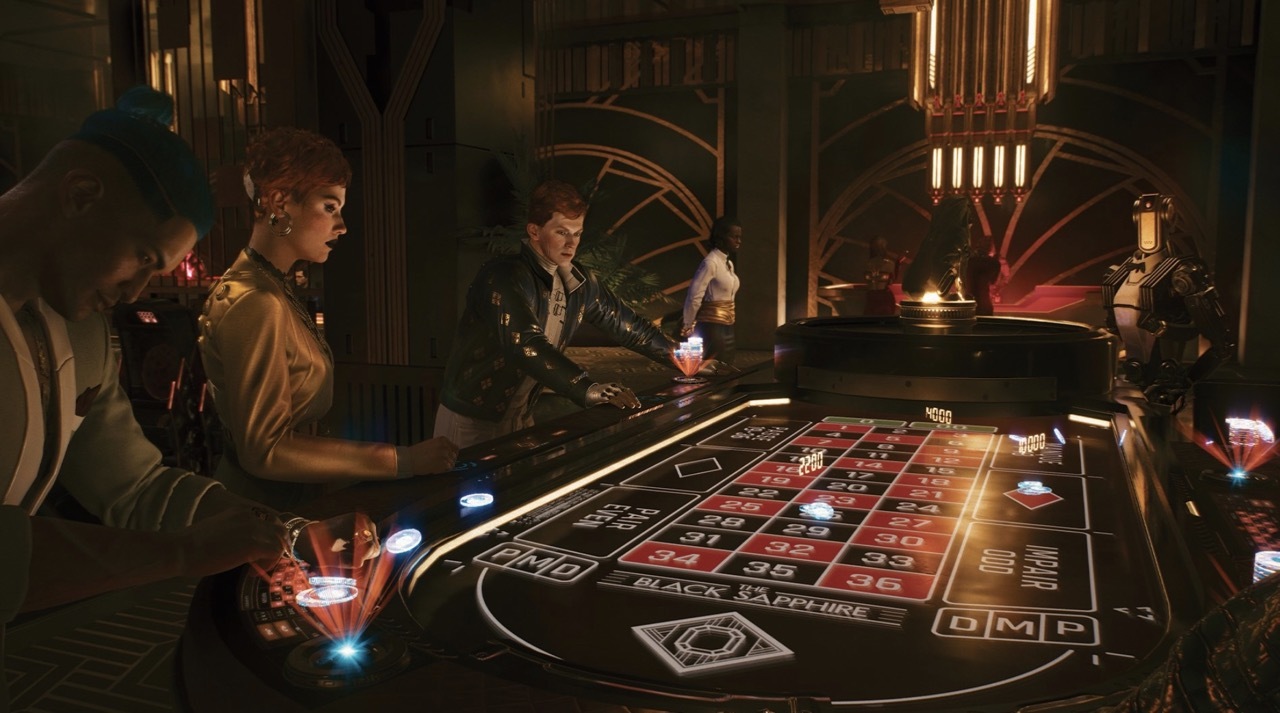Phantom Liberty made a major impact on how things play out.
They’ve escaped capture.
They’re home free.

Now Playing:Cyberpunk 2077: Phantom Liberty — Official Cinematic Trailer
Both of them are tired, bloody, bruised, but hopeful.
You need a javascript enabled net web client to watch videos.
Want us to remember this setting for all your devices?

One of them is a liar.
The lie means only one of them gets to be free.
They both deserve it, have experienced immense amounts of pain to get it.
The liar has fallen unconscious.
The other has a choice to make.
Some minutes later, I make a phone call.
And as the final few hours of the game play out, a monologue comes to mind.
“The hardest thing for me was leaving the life.
I still love the life.
We were treated like movie stars with muscle.
We had it all just for the asking….Anything I wanted was a phone call away.
The keys to a dozen hideout flats all over the city.
It didn’t mean anything.
When I was broke, I’d go out and rob some more.
We paid off cops.
We paid off lawyers.
We paid off judges.
Everybody had their hands out.
Everything was for the taking.
And now, it’s all over.
And that’s the hardest part.
Today, everything is different.
There’s no action.
I have to wait around like everyone else.
Can’t even get decent food.
I’m an average nobody.
I get to live the rest of my life like a schnook.”
That monologue, for those unaware, is how Martin Scorsese’s crime drama masterpiece Goodfellas ends.
It’s not framed as a happy ending or a downer ending, typically.
That’s not an ending you often see in a video game, for pretty obvious reasons, really.
When it came to the final notes of Cyberpunk 2077, however, CD Projekt RED thought different.
His existence means our protagonist, V, will die.
It’s hopeful, but in kind of a shallow way, unless you’ve romanced Panam.
At least you’ll leave a beautiful corpse.
Fast forward after a lot of people die, some jaw-dropping betrayals happen, and Hansen is dead.
That’s when the game throws the curveball.
Songbird’s been using V to get her to the home stretch.
Neither one feels great in the aftermath, but ultimately, I chose to call Reed.
There wasn’t even spite in that decision, though spite would be understandable.
I wasn’t even angry at Songbird for looking out for herself.
But that’s what video games are, right?
That’s what life is, by proxy.
And finally, mastery.
And when the circumstances change, repetition until the new becomes consistent.
That conflict is a big part of why many gamers rebelled against that ending in the moment.
Meanwhile, Bioware wanted the player’s emotional investment in said galaxy to determine how best to save it.
Ne’er the twain shall meet.
And so, V sat across from Songbird with a choice to make.
That scene is the last time we see Songbird, though Reed later assures V she’s alive.
It’s a strong ending.
But it’s not the ending.
The cure’s ready.
Reed’s One Last Mission is over.
He’s tired too.
Johnny’s monologue–and Keanu’s performance of it–is incredible, but haunting.
Reed’s a man without purpose now, his closest relationships now non-starters.
If he had emotional intelligence, he’d take his bartender friend with him.
He’ll be alone.
He’ll be empty.
I thought about this in the wake of Last of Us 2’sending as well.
That question is why it’s one of the most affecting and hollow endings in all of games.
Ellie’s not suicidal at least.
She’s upright, she’s walking, and she goes into the unknown ready for anything.
And that is what players get to find out when Phantom Liberty ends.
V eventually gets picked up by the NUSA to get the Relic removed.
Johnny is pissed about going back to being nothing, but at the very least, he understands.
And so, V is anesthetized, and goes under the knife.
The operation is successful, but with a pretty stunning side effect.
All of the major NPCs, including V’s love interest, have moved on.
Judy, in particular, is already a married professional, living way the hell away from Night City.
Now, the world at large can kill them dead at the drop of a dime.
CDPR could’ve left the game right there, with V lost in the gutter in bitter irony.
Instead, we get a grace note, one of the strongest in recent memory.
About a lot of things.
About the dead folks along the way.
About how messed up Night City can be.
Night City should’ve destroyed her.
Instead, she’s on her way out, determined to keep moving, keep walking, keep surviving.
There are no side missions in Misty’s future.
There are no space heists.
There’s no climactic throwdown with Adam Smasher.
There’s just life.
Misty gets to live the rest of her life as one of Henry Hill’s average nobodies.
It’s an opportunity.
It’s incredible power that stops feeling like power after a while because there is nothing in contrast.
Power fantasy, by nature, requires nuance to die screaming.
That’s power that video games don’t normally value.
In the very end, Phantom Liberty prizes it like no other perk in the game.
The circumstances of being an Edgerunner constantly strip that away.
And that’s the easiest part.
Now, everything is different.
There’s no action.
V has to wait around like everyone else.
V is an average nobody.
They get the privilege of living the rest of their life like a schnook.
Got a news tip or want to contact us directly?